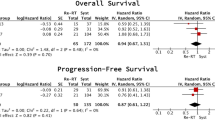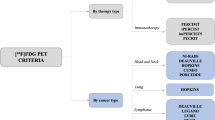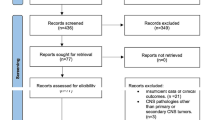Abstract
To determine the safety, tolerability, and report on secondary efficacy endpoints of motexafin gadolinium (MGd) in combination with whole-brain radiotherapy (WBRT) and stereotactic radiosurgery (SRS) for patients with ≤6 brain metastases. We conducted an international study of WBRT (37.5 Gy in 15 fractions) and SRS (15–21 Gy) with the addition of MGd (5 mg/kg preceding each fraction beginning week 2). The primary endpoint was to evaluate the rate of irreversible grade 3 or any grade ≥4 neurotoxicity and establish feasibility in preparation for a phase III trial. Sixty-five patients were enrolled from 14 institutions, of which 45 (69%) received SRS with MGd as intended and were available for evaluation. Grade ≥3 neurotoxicity attributable to radiation therapy within 3 months of SRS was seen in 2 patients (4.4%), including generalized weakness and radionecrosis requiring surgical management. Immediately following the course of MGd plus WBRT, new brain metastases were detected in 11 patients (24.4%) at the time of the SRS treatment planning MRI. The actuarial incidence of neurologic progression at 6 months and 1 year was 17 and 20%, respectively. The median investigator-determined neurologic progression free survival and overall survival times were 8 (95% CI: 5–14) and 9 months (95% CI: 6–not reached), respectively. We observed a low rate of neurotoxicity, demonstrating that the addition of MGd does not increase the incidence or severity of neurologic complications from WBRT with SRS boost.


Similar content being viewed by others
References
Richards P, Mc KW (1963) Intracranial metastases. Br Med J 1:15–18
Lang EF, Slater J (1964) Metastatic brain tumors. Results of surgical and nonsurgical treatment. Surg Clin North Am 44:865–872
Borgelt B, Gelber R, Kramer S et al (1980) The palliation of brain metastases: final results of the first two studies by the Radiation Therapy Oncology Group. Int J Radiat Oncol Biol Phys 6:1–9
Kondziolka D, Patel A, Lunsford LD et al (1999) Stereotactic radiosurgery plus whole brain radiotherapy versus radiotherapy alone for patients with multiple brain metastases. Int J Radiat Oncol Biol Phys 45:427–434
Andrews DW, Scott CB, Sperduto PW et al (2004) Whole brain radiation therapy with or without stereotactic radiosurgery boost for patients with one to three brain metastases: phase III results of the RTOG 9508 randomised trial. Lancet 363:1665–1672
Bhatnagar AK, Flickinger JC, Kondziolka D et al (2006) Stereotactic radiosurgery for four or more intracranial metastases. Int J Radiat Oncol Biol Phys 64:898–903
Zahedi Avval F, Berndt C, Pramanik A et al (2009) Mechanism of inhibition of ribonucleotide reductase with motexafin gadolinium (MGd). Biochem Biophys Res Commun 379:775–779
Hashemy SI, Ungerstedt JS, Zahedi Avval F et al (2006) Motexafin gadolinium, a tumor-selective drug targeting thioredoxin reductase and ribonucleotide reductase. J Biol Chem 281:10691–106977
Magda D, Lecane P, Miller RA et al (2005) Motexafin gadolinium disrupts zinc metabolism in human cancer cell lines. Cancer Res 65:3837–3845
Amato RJ, Jac J, Hernandez-McClain J (2008) Motexafin gadolinium for the treatment of metastatic renal cell carcinoma: phase II study results. Clin Genitourin Cancer 6:73–78
Lecane PS, Karaman MW, Sirisawad M et al (2005) Motexafin gadolinium and zinc induce oxidative stress responses and apoptosis in B-cell lymphoma lines. Cancer Res 65:11676–11688
Magda D, Lepp C, Gerasimchuk N et al (2001) Redox cycling by motexafin gadolinium enhances cellular response to ionizing radiation by forming reactive oxygen species. Int J Radiat Oncol Biol Phys 51:1025–1036
Miller RA, Woodburn K, Fan Q et al (1999) In vivo animal studies with gadolinium (III) texaphyrin as a radiation enhancer. Int J Radiat Oncol Biol Phys 45:981–989
Miller RA, Woodburn KW, Fan Q et al (2001) Motexafin gadolinium: a redox active drug that enhances the efficacy of bleomycin and doxorubicin. Clin Cancer Res 7:3215–3221
Xu S, Zakian K, Thaler H et al (2001) Effects of Motexafin gadolinium on tumor metabolism and radiation sensitivity. Int J Radiat Oncol Biol Phys 49:1381–1390
Bepler G, Zheng Z, Gautam A et al (2005) Ribonucleotide reductase M1 gene promoter activity, polymorphisms, population frequencies, and clinical relevance. Lung Cancer 47:183–192
Rosenthal DI, Nurenberg P, Becerra CR et al (1999) A phase I single-dose trial of gadolinium texaphyrin (Gd-Tex), a tumor selective radiation sensitizer detectable by magnetic resonance imaging. Clin Cancer Res 5:739–745
Viala J, Vanel D, Meingan P et al (1999) Phases IB and II multidose trial of gadolinium texaphyrin, a radiation sensitizer detectable at MR imaging: preliminary results in brain metastases. Radiology 212:755–759
Mehta MP, Shapiro WR, Phan SC et al (2008) Motexafin gadolinium combined with prompt whole brain radiotherapy prolongs time to neurologic progression in non-small-cell lung cancer patients with brain metastases: results of a phase III trial. Int J Radiat Oncol Biol Phys 73:1069–1076
World Medical Association Declaration of Helsinki (2001) Ethical principles for medical research involving human subjects. Bull World Health Organ 79:373–374
Shaw E, Scott C, Souhami L et al (2000) Single dose radiosurgical treatment of recurrent previously irradiated primary brain tumors and brain metastases: final report of RTOG protocol 90–05. Int J Radiat Oncol Biol Phys 47:291–298
Gaspar L, Scott C, Rotman M et al (1997) Recursive partitioning analysis (RPA) of prognostic factors in three Radiation Therapy Oncology Group (RTOG) brain metastases trials. Int J Radiat Oncol Biol Phys 37:745–751
Aoyama H, Shirato H, Tago M et al (2006) Stereotactic radiosurgery plus whole-brain radiation therapy vs stereotactic radiosurgery alone for treatment of brain metastases: a randomized controlled trial. JAMA 295:2483–2491
Bradley KA, Pollack IF, Reid JM et al (2008) Motexafin gadolinium and involved field radiation therapy for intrinsic pontine glioma of childhood: a Children’s Oncology Group phase I study. Neuro Oncol 10:752–758
Ford JM, Seiferheld W, Alger JR et al (2007) Results of the phase I dose-escalating study of motexafin gadolinium with standard radiotherapy in patients with glioblastoma multiforme. Int J Radiat Oncol Biol Phys 69:831–838
William WN Jr, Zinner RG, Karp DD et al (2007) Phase I trial of motexafin gadolinium in combination with docetaxel and cisplatin for the treatment of non-small cell lung cancer. J Thorac Oncol 2:745–750
Mehta MP, Rodrigus P, Terhaard CH et al (2003) Survival and neurologic outcomes in a randomized trial of motexafin gadolinium and whole-brain radiation therapy in brain metastases. J Clin Oncol 21:2529–2536
Chang EL, Wefel JS, Hess KR et al (2009) Neurocognition in patients with brain metastases treated with radiosurgery or radiosurgery plus whole-brain irradiation: a randomised controlled trial. Lancet 10:1037–1044
Li J, Bentzen SM, Renschler M et al (2007) Regression after whole-brain radiation therapy for brain metastases correlates with survival and improved neurocognitive function. J Clin Oncol 25:1260–1266
Aoyama H, Tago M, Kato N et al (2007) Neurocognitive function of patients with brain metastasis who received either whole brain radiotherapy plus stereotactic radiosurgery or radiosurgery alone. Int J Radiat Oncol Biol Phys 68:1388–1395
Wu GN, Ford JM, Alger JR (2003) MRI measurement of the uptake and retention of motexafin gadolinium in glioblastoma multiforme and uninvolved normal human brain. J Neurooncol 77:95–103
Acknowledgments
Trial was sponsored and supported by Pharmacyclics Inc., Sunnyvale, CA.
Conflict of interest
1. Minesh Mehta serves on the Board of Directors of Pharmacyclics (paid, including stock options), Inc. and is a consultant for Schering-Plough, Genentech, Tomotherapy (including stock options), Bayer, and Adnexus. 2. Tarak Mody is a Senior Director for Development for Pharmacyclics, Inc. All additional authors report no conflicts of interests.
Author information
Authors and Affiliations
Corresponding author
Additional information
This trial, PCYC-0224, is registered through the NIH at http://clinicaltrials.gov with an identifier of NCT00121420.
Rights and permissions
About this article
Cite this article
McHaffie, D.R., Chabot, P., Dagnault, A. et al. Safety and feasibility of motexafin gadolinium administration with whole brain radiation therapy and stereotactic radiosurgery boost in the treatment of ≤6 brain metastases: a multi-institutional phase II trial. J Neurooncol 105, 301–308 (2011). https://doi.org/10.1007/s11060-011-0590-9
Received:
Accepted:
Published:
Issue Date:
DOI: https://doi.org/10.1007/s11060-011-0590-9




